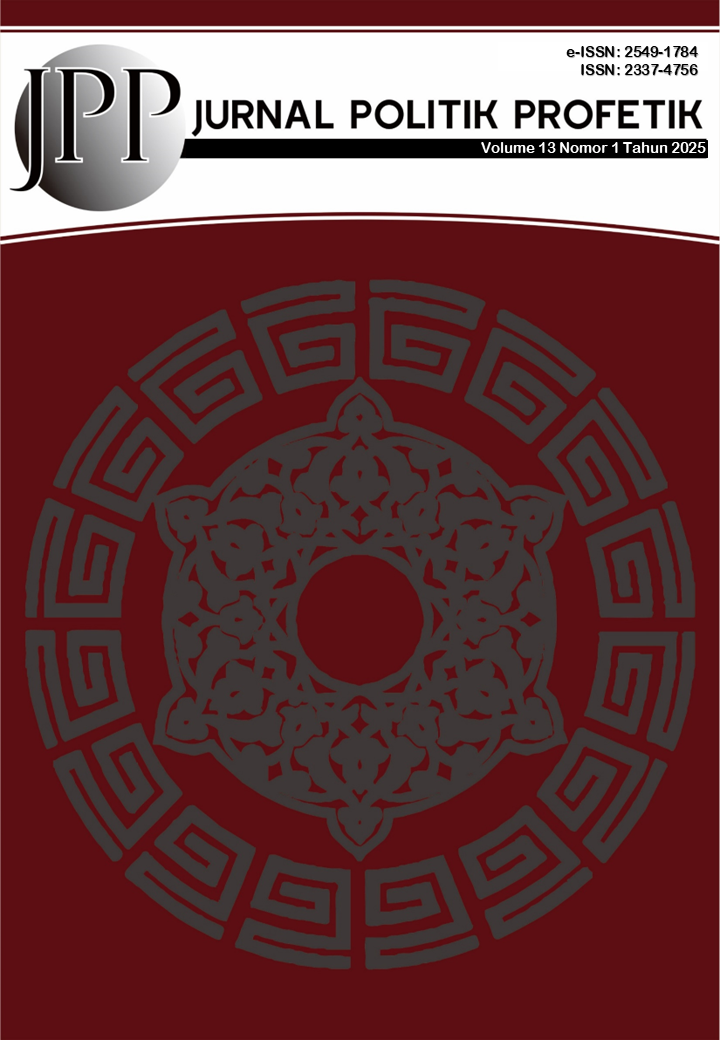Dinamika Relasi Negara dan Civil Society dalam Pembangunan Perdamaian di Ambon 2002-2022
DOI:
https://doi.org/10.24252/profetik.v13i1a5Keywords:
Power Transformation, State, Civil Society, ReconciliationAbstract
This article analyzes the dynamics of the relationship between the state and civil society in the peacebuilding process in post-conflict Ambon from 1999 to 2002. Using J.P. Lederach's conflict transformation theory framework and Pierre Bourdieu's social capital concept, this study explores the evolution of the relationship between the two actors during the period from 2002 to 2022. A qualitative research method with a case study approach is used to analyze the processes of reconciliation, rehabilitation, and social reconstruction. The findings show that the state-civil society relations have transformed from a hierarchical-centralist pattern to a collaborative-participative one. Civil society acts as a bridge in building trust among groups, while the state provides legal frameworks and structural support. The social capital accumulated through interfaith dialogues, joint economic programs, and cultural initiatives has proven effective in strengthening social cohesion and preventing escalation of horizontal conflicts in Ambon.
Downloads
References
Alici, N. (2024). Learning from civil society actors in Turkey: Using transitional justice in an ongoing conflict. The International Journal of Transitional Justice, 18(2), 250-266. https://doi.org/10.1093/ijtj/ijae015
Arslan, A., Kamara, S., Golgeci, I., & Tarba, S. Y. (2022). Civil society organisations’ management dynamics and social value creation in the post-conflict volatile contexts pre and during COVID-19. International Journal of Organizational Analysis, 30(7), 20-33. https://doi.org/10.1108/IJOA-01-2021-2573
Bourdieu, P. (1977). Outline of a Theory of Practice. Cambridge University Press.
Bourdieu, P. (1984). Distinction: A Social Critique of the Judgement of Taste. Harvard University Press.
Bourdieu, P. (1991). Language and Symbolic Power. Harvard University Press.
Creswell, J. W., & Poth, C. N. (2018). Qualitative Inquiry and Research Design: Choosing Among Five Approaches. Sage Publications.
Fiedler, C. (2023). What Do We Know about How Armed Conflict Affects Social Cohesion? A Review of the Empirical Literature. International Studies Review, 25(3), 1-34. https://doi.org/10.1093/isr/viad030
Lederach, J. P. (1997). Building Peace: Sustainable Reconciliation in Divided Societies. United States Institute of Peace Press.
Lederach, J. P. (2005). The Moral Imagination: The Art and Soul of Building Peace. Oxford University Press.
Lederach, J. P. (2014). The Little Book of Conflict Transformation. Good Books.
Lestari, D. T. (2020). Merawat Harmoni Agama melalui Kolaborasi Musik Hadroh dan Trompet di Ambon. Religious: Jurnal Studi Agama-Agama Dan Lintas Budaya, 4(3), 215-226. https://doi.org/10.15575/rjsalb.v4i3.8880
Natil, I. (2021). Conflict, Civil Society, and Women's Empowerment: Insights from the West Bank and the Gaza Strip. Emerald Publishing Limited.
Nilsson, M. (2018). Civil society actors in peace negotiations in Central America. Journal of Civil Society, 14(2), 135-152. https://doi.org/10.1080/17448689.2018.1484004
Paffenholz, T. (2014). International peacebuilding goes local: analysing Lederach's conflict transformation theory and its ambivalent encounter with 20 years of practice, Peacebuilding, 2(1), 11-27. https://doi.org/10.1080/21647259.2013.783257
Parto, S. (2018). Civil society–state relations in peace and conflict. McGill Centre for Human Rights & Legal Pluralism. McGill University. https://www.mcgill.ca/humanrights/article/70th-anniversary-universal-declaration-human-rights/civil-society-state-relations-peace-and-conflict
Shnabel, N., & Ullrich, J. (2017). Confronting History and Reconciliation: A Review of Civil Society's Approaches to Transforming Conflict Narratives. In Intergroup Contact Theory (pp. 45-62). Springer.
Sihite, G. M., Malik, I., KY, I. G. S., & Widodo, P. (2023). Peran Organisasi Masyarakat Sipil/Civil Society Organization (Cso) Dalam Menyelesaikan Konflik Agraria Di Indonesia. NUSANTARA: Jurnal Ilmu Pengetahuan Sosial, 10(11), 5232-5244.
Tidore, B. (2022). Resolusi Konflik Berbasis Teologi Baku Bae Ambon (1999-2002). Media: Jurnal Filsafat Dan Teologi, 3(2), 212-235. https://doi.org/10.53396/media.v3i2.111
Trihartono, A., & Viartasiwi, N. (2015). Engaging the quiet mission: Civil society in breaking the cycle of violence in the post-conflict Poso, Indonesia. Procedia Environmental Sciences, 28, 115-123. https://doi.org/10.1016/j.proenv.2015.07.017
van Munster, M., & van Wijk, J. (2025). Angola’s Reconciliation Commission CIVICOP: Delayed Transitional Justice in a Non-Transitional Authoritarian Context. The International Journal of Transitional Justice, ijaf007, 1-18. https://doi.org/10.1093/ijtj/ijaf007
Visoka, G. (2018). Agents of peace: Place, Identity and Peacebuilding. In The politics of identity: Place, space and discourse (pp. 71-88). Manchester University Press.
Downloads
Published
How to Cite
Issue
Section
License
Copyright (c) 2025 Fadly Fahry S. Wally, Meidi Kosandi

This work is licensed under a Creative Commons Attribution-NonCommercial-ShareAlike 4.0 International License.




















